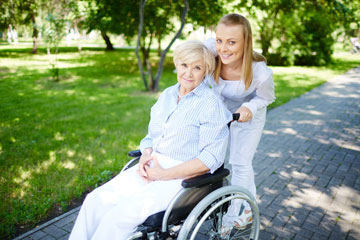Falls are one of the most cause for injury in older adults. In the US, the age-adjusted fall death rate is 64 deaths per 100,000 older adults and fall death rates among adults age 65 and older increased about 30% from 2009 to 2018. As people age, the number of risks factors for falls also increases.
The main risk factors for fall is fear of falling, poor reaction times and visual impairment. Other risk factors that cause falls in older people are rising age, use of high dozen medication, sensory deficit and cognitive impairment. Health condition such as heart disease, dementia, and high or low blood pressure can also dizziness and lead to falls.
Tips To Prevent Falls
It is important to take care of your overall health so that you can lower your chances of falling. Here are some tips to reduce risk of falling:
- Stay Physically Active: Follow an exercise program that is suitable for you. Regular exercise helps to improve muscles, keep your joints, tendons, and ligaments flexible and makes you stronger. Light weight-bearing activities, such as walking or climbing stairs, may slow bone loss from osteoporosis.
- Get Proper Sleep: Make sure to get enough sleep. If you are sleepy, you are more likely to fall.
- Know The Side Effects Of Any Medicine You Take: Find out if any of your medications makes you sleepy or dizzy. Talk to your doctor about whether it’s possible to reduce or eliminate the use of such medications.
- Always Stand Up Slowly: Getting up too quickly can cause your blood pressure to drop and make you feel wobbly. So always get up slowly. Make sure to get your blood pressure checked when lying and standing.
- Limit The Amount Of Alcohol You Drink: As you age, even a small amount of alcohol can affect your balance and reflexes. Studies show that the rate of hip fractures in older adults increases with increased alcohol consumption.
- Check Your Eye Sight And Hearing: Any minor changes in sight and hearing may cause you to fall. When you get new eyeglasses or contact lenses, take time to get used to them. Always wear your glasses or contacts when you need them. If you have a hearing aid, be sure it fits well and wear it.
- Use An Assistive Device To Help You With Walking: If you are unsteady in walking then use canes and walkers to prevent falls. Make sure it is the right size for you and the wheels roll smoothly. If you are walking on uneven areas, it is important to uses an assistive device. A physical or occupational therapist can help you decide which devices might be helpful and teach you how to use them safely.
- Be Very Careful When Walking On Wet Or Icy Surfaces: Wet areas can be very slippery. Spread salt or sand on icy areas by your front or back door.
- Wear Non-Skid Shoes: Wear non-skid rubber-soled, low-heeled shoes, or lace-up shoes with non-skid soles that can support your feet. It is important that the soles are not too thin or too thick. Don’t walk on stairs or floors in socks or in shoes and slippers with smooth soles.
- Inform Your Doctor If You Have Fallen After Your Last Check-Up, even if you didn’t get hurt when you fell. A fall can alert your doctor to a new medical problem or problems with your medications or eyesight that can be corrected. Your doctor may suggest physical therapy, a walking aid, or other steps to help prevent future falls.
Environmental risk factors such as hazards found in and around the home and in public places, uneven surfaces and the lack of hand or grab rails increases the risk of falling. All these above- mentioned tips can help older adults to move around safely and avoid falling down and getting hurt.

